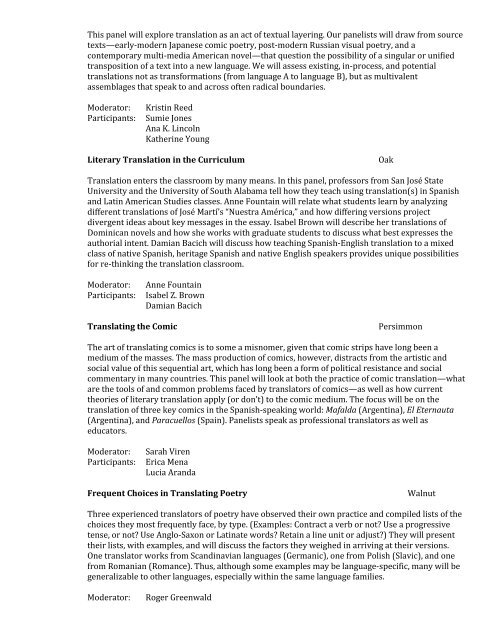AMERICAN LITERARY TRANSLATORS ASSOCIATION (ALTA ...
AMERICAN LITERARY TRANSLATORS ASSOCIATION (ALTA ...
AMERICAN LITERARY TRANSLATORS ASSOCIATION (ALTA ...
Create successful ePaper yourself
Turn your PDF publications into a flip-book with our unique Google optimized e-Paper software.
This panel will explore translation as an act of textual layering. Our panelists will draw from sourcetexts—early-modern Japanese comic poetry, post-modern Russian visual poetry, and acontemporary multi-media American novel—that question the possibility of a singular or unifiedtransposition of a text into a new language. We will assess existing, in-process, and potentialtranslations not as transformations (from language A to language B), but as multivalentassemblages that speak to and across often radical boundaries.Moderator:Participants:Kristin ReedSumie JonesAna K. LincolnKatherine YoungLiterary Translation in the CurriculumOakTranslation enters the classroom by many means. In this panel, professors from San José StateUniversity and the University of South Alabama tell how they teach using translation(s) in Spanishand Latin American Studies classes. Anne Fountain will relate what students learn by analyzingdifferent translations of José Martí’s “Nuestra América,” and how differing versions projectdivergent ideas about key messages in the essay. Isabel Brown will describe her translations ofDominican novels and how she works with graduate students to discuss what best expresses theauthorial intent. Damian Bacich will discuss how teaching Spanish-English translation to a mixedclass of native Spanish, heritage Spanish and native English speakers provides unique possibilitiesfor re-thinking the translation classroom.Moderator:Participants:Anne FountainIsabel Z. BrownDamian BacichTranslating the ComicPersimmonThe art of translating comics is to some a misnomer, given that comic strips have long been amedium of the masses. The mass production of comics, however, distracts from the artistic andsocial value of this sequential art, which has long been a form of political resistance and socialcommentary in many countries. This panel will look at both the practice of comic translation—whatare the tools of and common problems faced by translators of comics—as well as how currenttheories of literary translation apply (or don’t) to the comic medium. The focus will be on thetranslation of three key comics in the Spanish-speaking world: Mafalda (Argentina), El Eternauta(Argentina), and Paracuellos (Spain). Panelists speak as professional translators as well aseducators.Moderator:Participants:Sarah VirenErica MenaLucia ArandaFrequent Choices in Translating PoetryWalnutThree experienced translators of poetry have observed their own practice and compiled lists of thechoices they most frequently face, by type. (Examples: Contract a verb or not? Use a progressivetense, or not? Use Anglo-Saxon or Latinate words? Retain a line unit or adjust?) They will presenttheir lists, with examples, and will discuss the factors they weighed in arriving at their versions.One translator works from Scandinavian languages (Germanic), one from Polish (Slavic), and onefrom Romanian (Romance). Thus, although some examples may be language-specific, many will begeneralizable to other languages, especially within the same language families.Moderator:Roger Greenwald
















